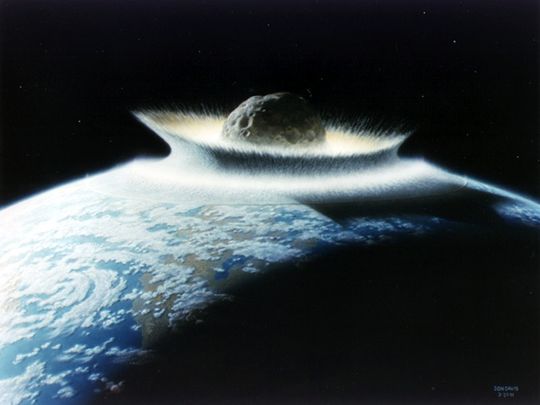
The bleak warning came from James Garvin, chief scientist at the Goddard Space Flight Center in Maryland.
He and his team examined data from numerous Earth-observing satellites to analyze four impact craters. Garvin and his colleagues used high-resolution imagery of the said craters in different locations around the globe made over the past one million years. Among the locations they examined were Pantasma in Nicaragua, Lake Bosumtwi in Ghana, Iturralde in Bolivia and Zhamanshin in Kazakhstan.
Their analysis led to the discovery of four asteroids powerful enough to destroy part of the atmosphere the moment the space rocks hit Earth. If the latest data are correct, the impacts would compare to an explosion 10 times more powerful than the biggest nuclear bomb in history, causing a mass extinction. (Related: Humanity is one asteroid impact away from being wiped out.)
"We have focused attention on four complex impact craters that span the past [one million years] of Earth history, mostly within tropical regions, with differing target rock characteristics," Garvin said upon presentation of their findings at the Lunar and Planetary Science Conference in Texas.
While sizable space rocks are expected to hit Earth only once every 600,000 to 700,000 years, Garvin said any asteroids close to the ones that caused the formation of the four impact craters "would be in the range of serious c**p happening."
Garvin's planetary defense study yields more surprising finds
While Garvin and his team only carried out the study as part of planetary defense research, they discovered more than they could have imagined. Their findings also debunked previous perceptions about the measurements of the four impact craters that they looked at.
According to initial analyses, the nine-mile-wide Pantasma crater in Nicaragua was allegedly created after an asteroid fell to Earth some 800,000 years ago with an impact of 660,000 megatons. The re-examination found that Pantasma was actually more than twice as large as the original measurement – with its new dimension measuring 21 miles wide.
The impact was also stronger – amounting to 727,000 megatons. An asteroid impact of that scale would be enough to "blow off part of the planet's atmosphere and distribute impact glasses globally," according to the NASA scientist.
The Zhamanshin crater in Kazakhstan's western Aktobe region was earlier reported as being just seven miles wide. But the new analysis revealed that its outer rim actually measured 18 miles, more than twice the original measurement.
The Iturralde crater in Bolivia's northern La Paz department, also called the Araona Crater, was initially recorded as being six miles wide. But the analysis done by Garvin and his colleagues found that it was actually thrice as big – 18 miles.
Lastly, the team's analysis of Lake Bosumtwi in Ghana – originally a crater – expounded on its actual measurements. They noted that its outermost rim measures 16 miles, and its inner peak ring measures six miles.
Nevertheless, not everyone is in agreement with Gavin's findings.
"I'm skeptical. I want to see a lot more before I believe it," sad Bill Bottke, a planetary dynamicist at the Southwest Research Institute in Boulder, Colorado.
Anna Losiak, a crater researcher at the Polish Academy of Sciences, expressed doubt that the recently discovered "rims" are part of the impact site. "That would be very scary because it would mean we really don't understand what's going on at all, and that there are a lot of space rocks that may come and make a mess," Losiak said.
Follow Space.news for more about asteroids approaching Earth.
Watch this video about NASA's warning of an unstoppable giant asteroid heading Earth's way.
This video is from the Red Pilled News channel on Brighteon.com.
More related stories:
Space hazards: 8 Huge asteroids made closest approach to Earth in the first 14 days of 2023.
Just one asteroid strike thrust the planet into YEARS of darkness, killing almost everything.
Sources include:
Please contact us for more information.























